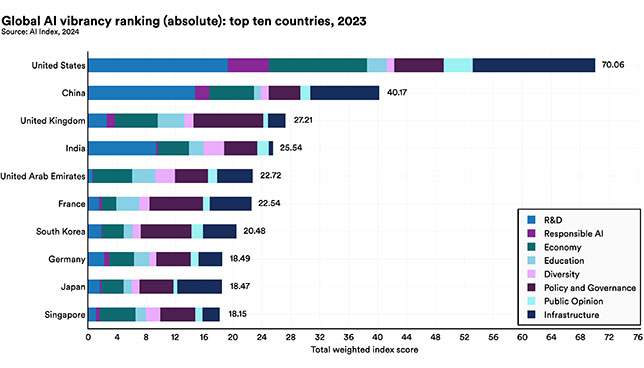
A new ranking tool from the Stanford Institute for Human-Centered AI (HAI) AI Index puts the United States in the No. 1 spot for global AI leadership.

A new report from the Cloud Security Alliance highlights the need for AI audits that extend beyond regulatory compliance, and advocates for a risk-based, comprehensive methodology designed to foster trust in rapidly evolving intelligent systems.

Educause recently released its annual Top 10 list of the most important technology issues facing colleges and universities in the coming year, with a familiar trio leading the bunch: data, analytics, and AI. But the report presents these critical technologies through a new lens: restoring trust in higher education.

It pays to be conversant in cloud, according to a new study from Skillsoft The company's annual IT skills and salary survey report found that the top three certifications resulting in the highest payoffs salarywise are for skills in the cloud, specifically related to Amazon Web Services (AWS), Google Cloud, and Nutanix.

Mobile and IoT/OT cyber threats continue to grow in number and complexity, becoming more targeted and sophisticated, according to a new report from Zscaler.

Agentic AI will be the top tech trend for 2025, according to research firm Gartner. The term describes autonomous machine "agents" that move beyond query-and-response generative chatbots to do enterprise-related tasks without human guidance.

AI governance, AI-enabled workforce expansion, and AI-supported cybersecurity training are three of the six key technologies and practices anticipated to have a significant impact on the future of cybersecurity and privacy in higher education, according to the latest Cybersecurity and Privacy edition of the Educause Horizon Report.

Educause recently released the 2024 Cybersecurity and Privacy Edition of its Horizon Report series, forecasting key trends, technologies, and practices shaping the future of cybersecurity and privacy in higher education.

In a few years, nearly three quarters of network operators will use generative AI for SD-WAN management, according to a new report from research firm Gartner.

Advanced AI can defeat CAPTCHAs designed to prove web actions are being performed by humans instead of machines, new research indicates.